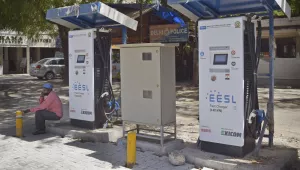
Abstract
Capacity-building is acknowledged as an essential requirement for addressing environmental and developmental challenges in developing countries. In particular, the capacity to manage technological change is an important prerequisite for climate change mitigation, adaptation and green growth. Despite the importance of such capacity, there are surprisingly few empirical accounts unpacking its different dimensions and exploring how it might be built in developing countries in the context of climate and sustainable development challenges. In this paper, we contribute to this sparse literature through an in-depth qualitative case study on energy efficiency in India. Specifically, we take a systemic and evolutionary perspective to investigate how the Bureau of Energy Efficiency developed and implemented its programs to promote energy efficiency in household appliances, light-emitting-diode lamps and energy-intensive industries – and how in doing so, both drew upon existing capacity within and outside the country, and also built new capacity, to achieve significant energy savings.
Key Policy Insights
- Since the capacity to manage technological change is distributed among a range of actors, policymakers require the ability to understand capacity needs from multiple actors’ perspectives.
- Policymakers need to respond to evolving capacity needs over the course of a program – from strategic program design, trust-building and resource mobilization in early stages, to administration in later stages.
- ‘System operators/integrators’ can play a crucial role during the early stages of a program by helping develop capacity and sustaining it by creating a demand for such capacity, as well as bringing together actors, enabling coordination, and building coalitions among them.
- Preliminary analysis suggests that the Bureau of Energy Efficiency programs investigated in this paper resulted in significant energy savings and CO2 emission reductions.
Malhotra, Abhishek , Ajay Mathur, Saurabh Diddi and Ambuj D. Sagar. “Building Institutional Capacity for Addressing Climate and Sustainable Development Goals: Achieving Energy Efficiency in India.” Climate Policy, September 2021
The full text of this publication is available via Climate Policy.







